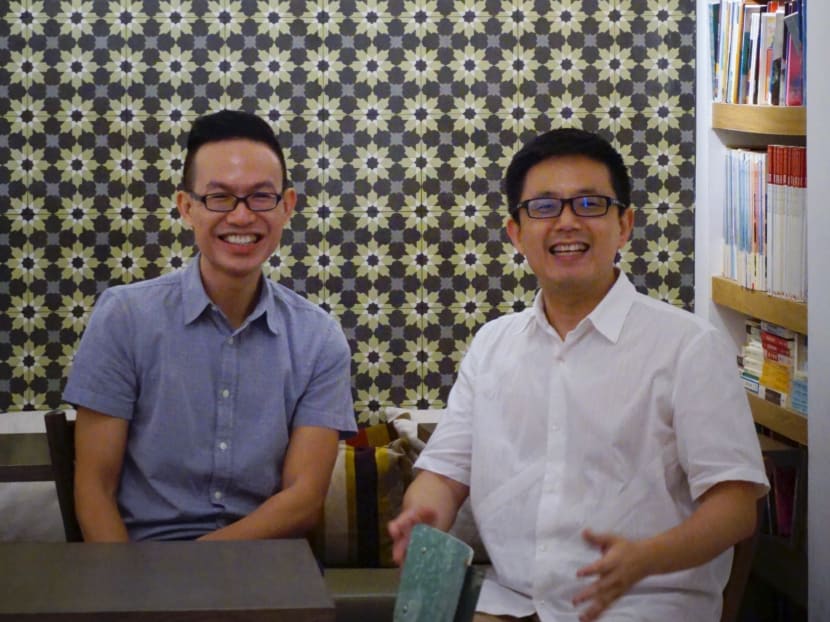Arts company The Select Centre puts spotlight on translation
SINGAPORE — I’m a rather recent convert to the works of Singaporean author Yeng Pway Ngon. But I would never have read his novels Unrest and Art Studio, which were originally written in Chinese, if it weren’t for the efforts of translators Jeremy Tiang, and Goh Beng Choo and Loh Guan Liang, respectively.

How do you say "The Select Centre" in Chinese, Malay and Tamil? Co-founders William Phuan and Tan Dan Feng will be putting the spotlight on the often thankless task of translation. Photo: The Select Centre.
SINGAPORE — I’m a rather recent convert to the works of Singaporean author Yeng Pway Ngon. But I would never have read his novels Unrest and Art Studio, which were originally written in Chinese, if it weren’t for the efforts of translators Jeremy Tiang, and Goh Beng Choo and Loh Guan Liang, respectively.
Which is why I’m quite excited about the arts scene’s latest “Centre”. If Centre 42 was set up to develop text-based works for the stage, recently-formed company The Select Centre (TSC) is putting the spotlight on the sometimes thankless but extremely vital discipline of translation.
TSC co-founders Tan Dan Feng (Select Books director, linguist and publisher) and William Phuan (former director of The Arts House and TSC’s managing director) unveiled their big plans for all things, erm, translatable today (Aug 26) at The Grassroots Book Room (which, coincidentally enough, is owned by Yeng).
TSC, a three-year National Arts Council seed grant recipient, has a few initiatives lined up this year, including The Translators Lab, an eight-week workshop focusing on translating local Chinese, Malay and Tamil works into English. It starts on Sept 12, with online sessions culminating in a three-day boot camp.
Two big projects will also be held at the end of October: Its inaugural translation festival TranslateSingapore, which will comprise a symposium, public programmes and school workshops; and a series of curated programmes at the Singapore Writers Festival, which will include panel discussions, performances and a couple of book launches (the English translation of Isa Kamari’s A History of Singapore Malay Poetry and the memoirs of the late dance pioneer KP Bhaskar).
But prior to all of these, the centre had already been busy: The Malay poetry book is the result of an ongoing residency project (with Chinese writings on the history of Nanyang painters the possible focus for the next one). Back in May, TSC had also kick-started the Literary Gateway series, bringing Alfian Sa’at and the UK’s Suzanne Joinson to Myanmar, where Burmese translators went to work on the two writers’ English works (there are also tentative plans to repeat the project, this time translating Chinese language works into Burmese).
To be perfectly clear, while there’s a connection “in spirit” between Select Books and TSC, these are two separate entities, said Tan. The former is a commercial entity that remains as a distributor and publisher of books (but without a bookstore presence), while the latter is a non-profit organisation that will be an “enabler”, i.e., it won’t be publishing books but will look into providing possible materials that other publishers and bookstores can work with, which is similar to Centre 42’s MO. At the same time, TSC is also currently looking for a space for its office as well as its “book room” to showcase works form Singapore and the region.
As a homegrown company, the initial focus is, understandably, translating local works primarily into English and, in the case of international efforts, into the other country’s languages. But these efforts could very well expand — after all, the idea of Singapore as Asia’s “translation hub” apparently isn’t new.
Tan highlighted the country’s rich history in said field, citing the likes of Munshi Abdullah Bin Abdul Kadir, considered the father of modern Malay literature and the Malacca-born scribe/ translator of Stamford Raffles, and Lim Boon Keng, who translated the epic Chinese poem Li Sao into English. And then there was the Mission Press from the 1850s, which published newspapers in Chinese and Jawi, and other works in English, Japanese and Thai. A couple of other fun facts: The earliest surviving Malay book (a translation of the Sermon On the Mount from 1829) and the oldest bible in Japanese (from 1837) were printed right here. So yes, Singapore already had way with words even back then.
But another interesting thing about TSC is its broader definition of translation: It’s not just about translating texts from one language to another; translation is part and parcel of issues relating to inter- and multiculturalism.
Phuan pointed out that the challenge for them is to shift the mindset regarding the idea of translation, admittedly a rather unsexy endeavour in the minds of some. “It’s not just about words or text,” he said, defining it in a looser sense that includes our everyday encounters with road signs in multiple languages, for example, or reading subtitles on television.
Indeed, “translation” isn’t something new, they point out. Singapore’s performing arts scene, for instance, has been doing all these linguistic codeswitching and cultural mash-ups for some time already (e.g. works done by TheatreWorks, The Necessary Stage and Drama Box; the late William Teo and Kuo Pao Kun; and the Bhaskars).
“That tradition of linking cultures has been part of our DNA” said Tan. As an example of how in-built the multilingual (and multicultural) aspects of life are among Singaporeans, he cited a quirky ad that appeared in The Straits Times in 1933. It was encouraging its English-proficient readers to beef up on their (Baba) Malay — by buying books of translated versions of Chinese classics.
For more information on The Select Centre and its programmes, visit http://www.selectcentre.org/








